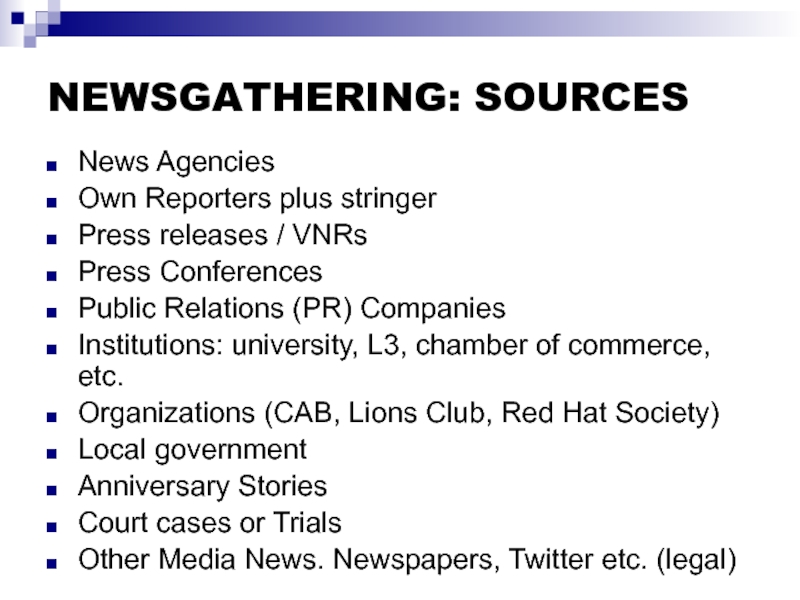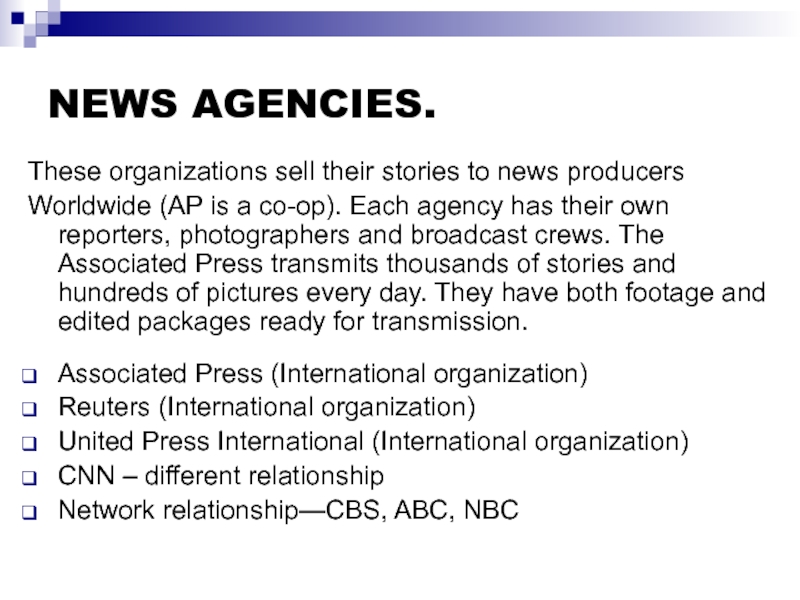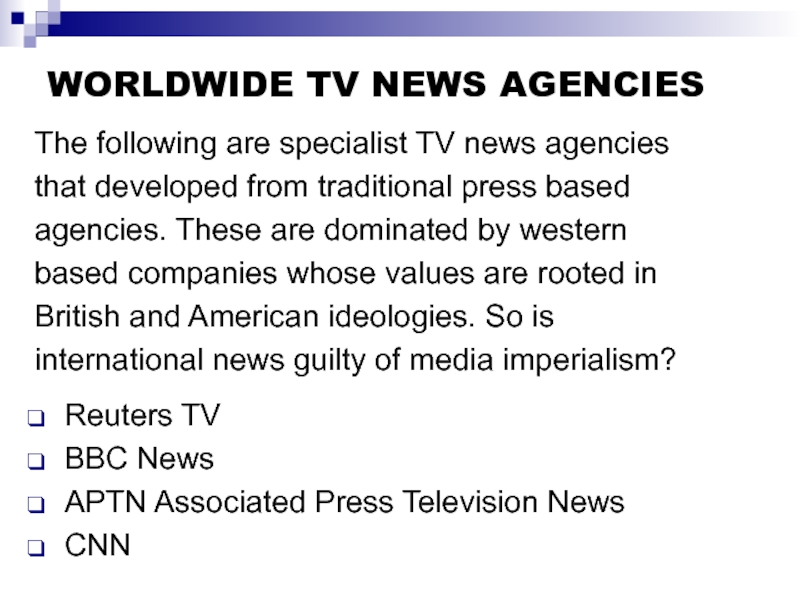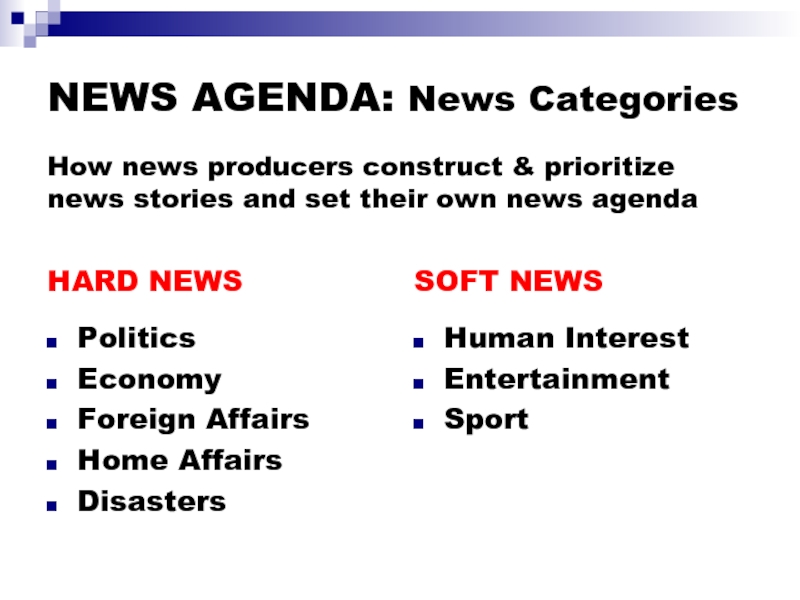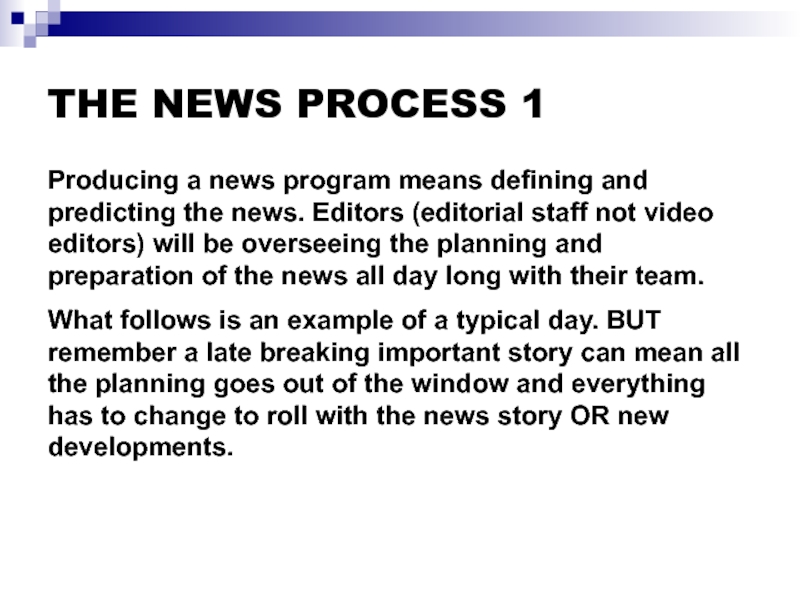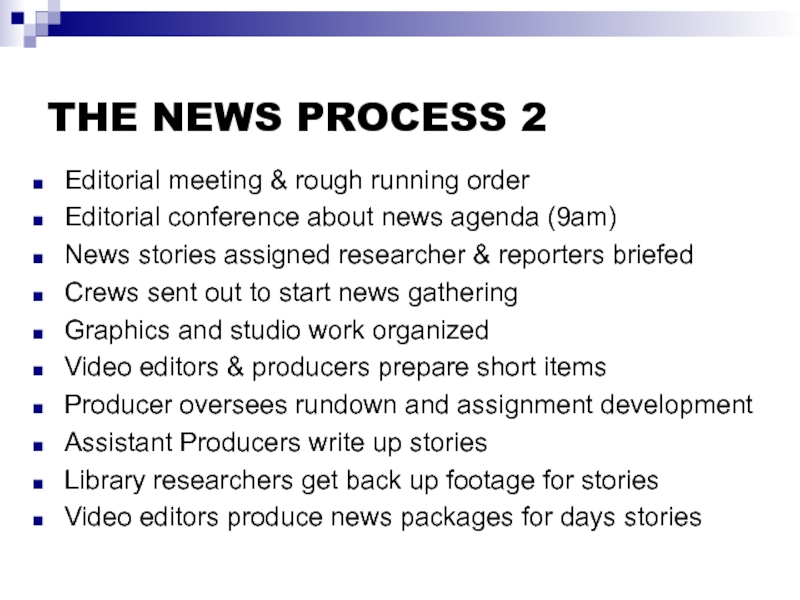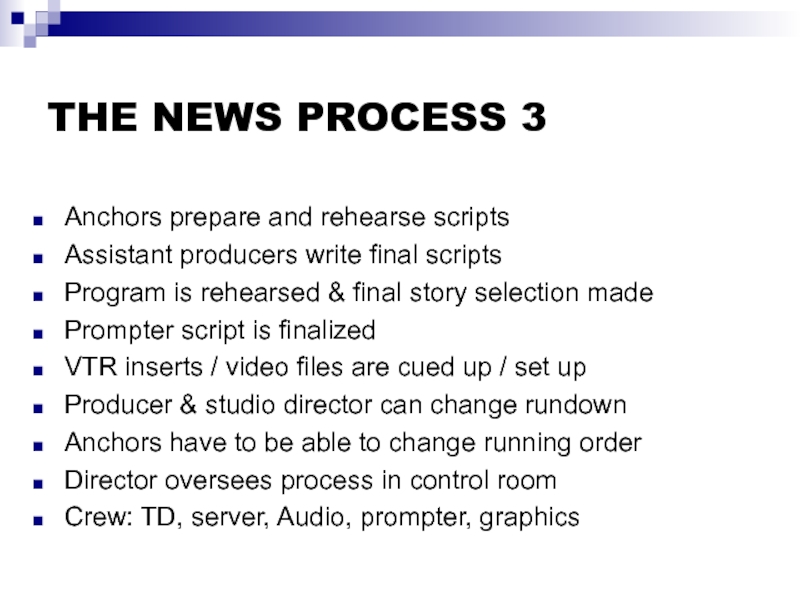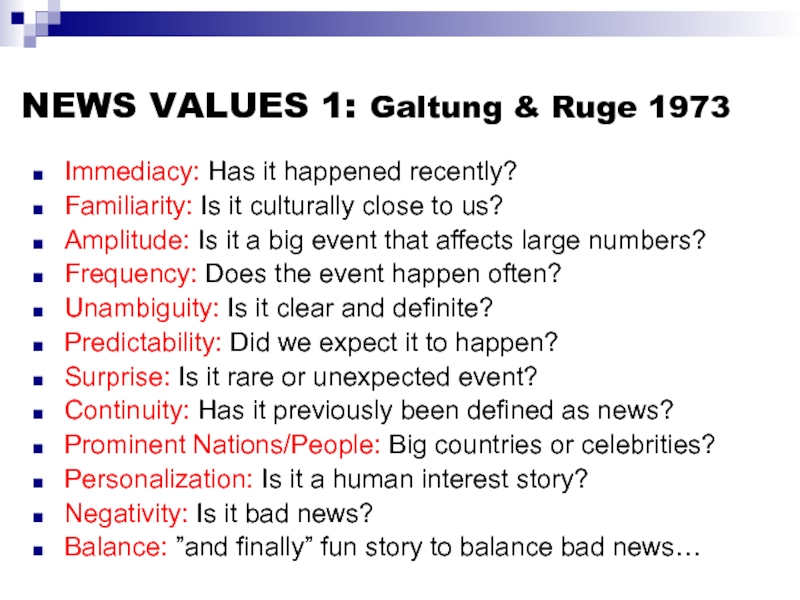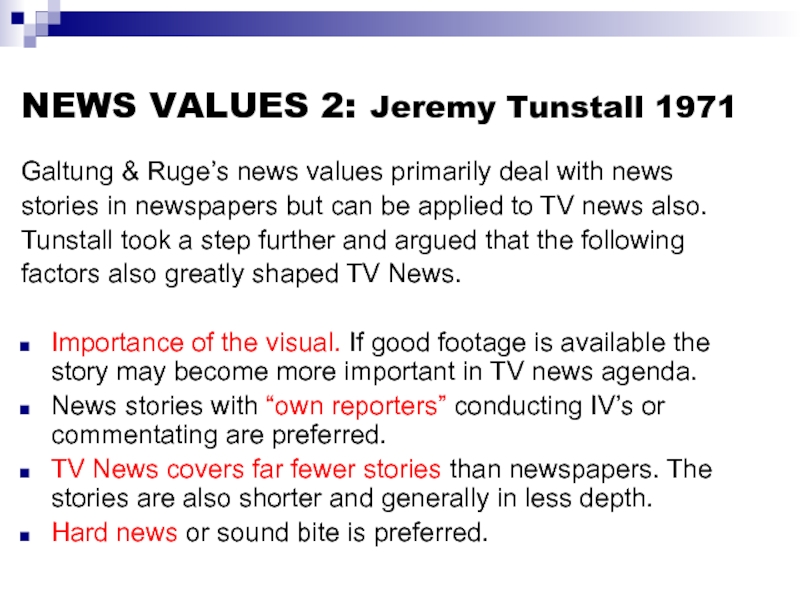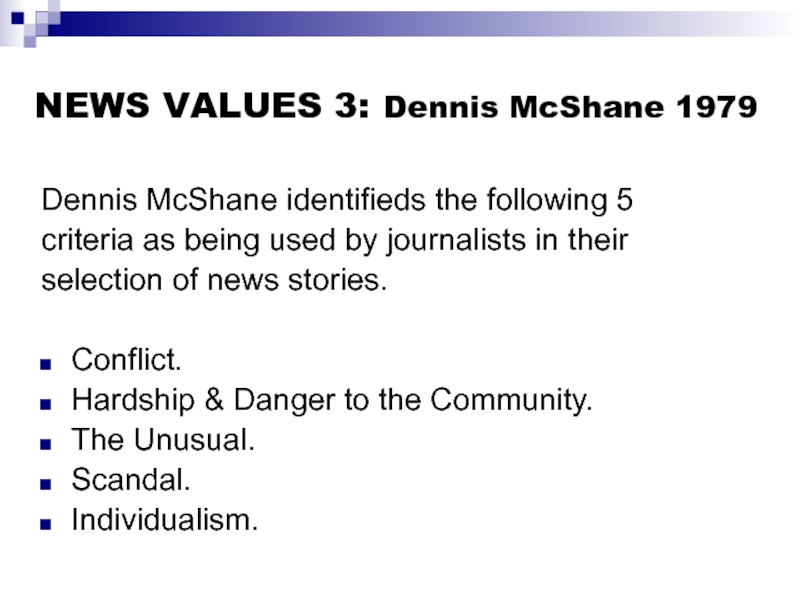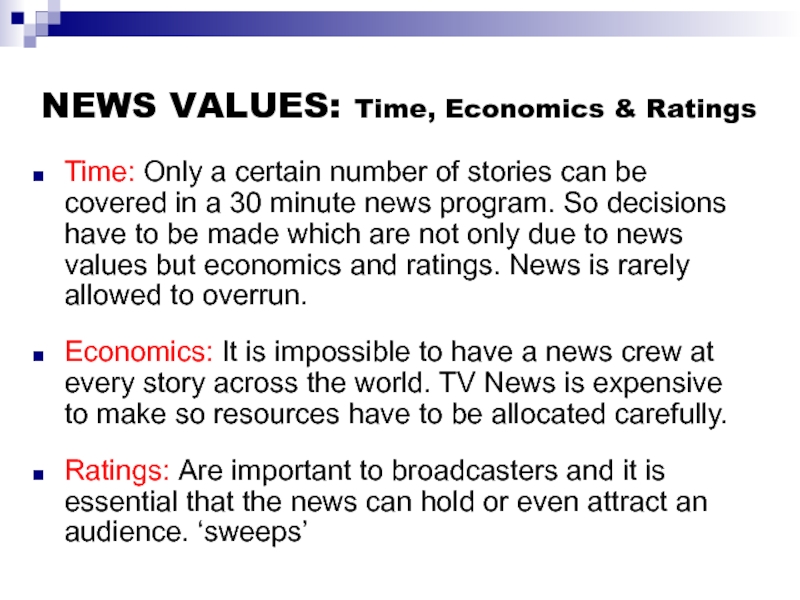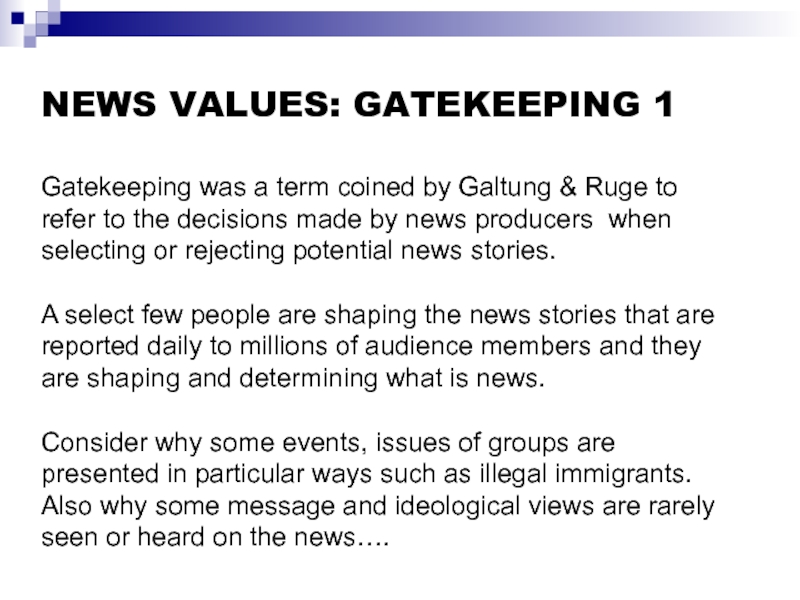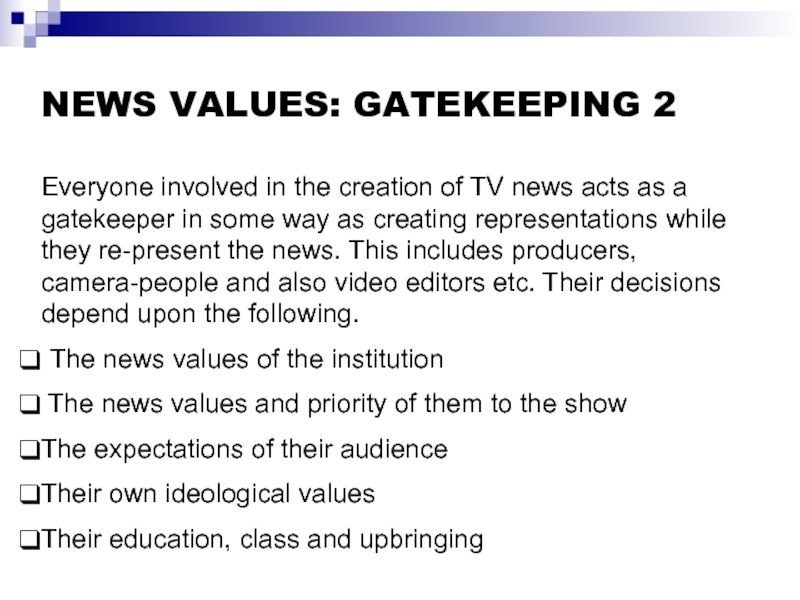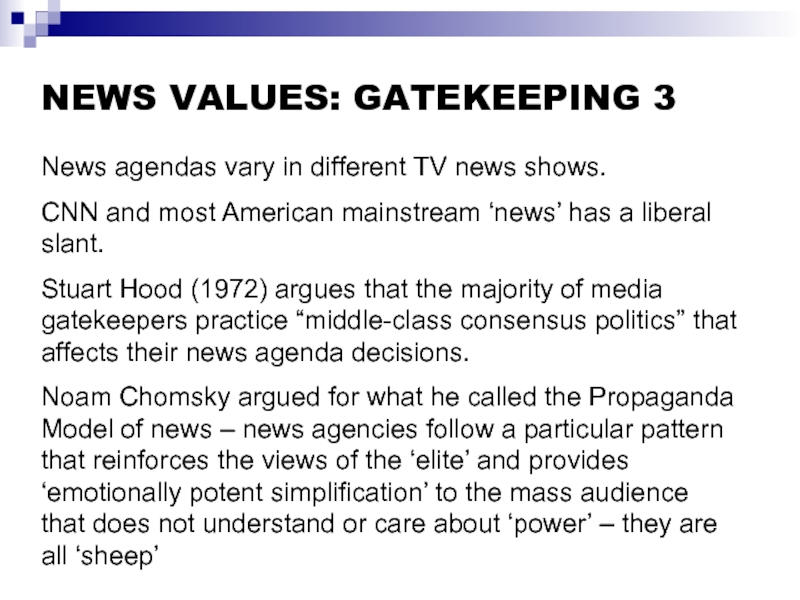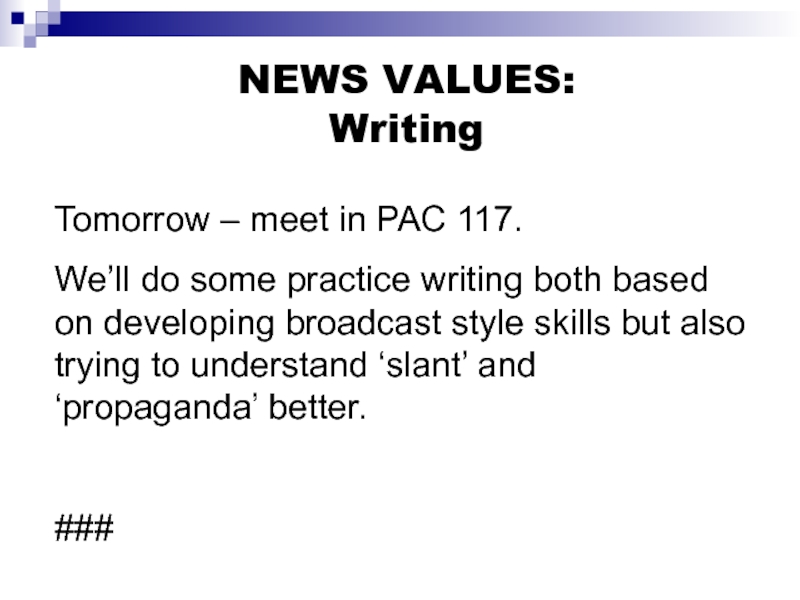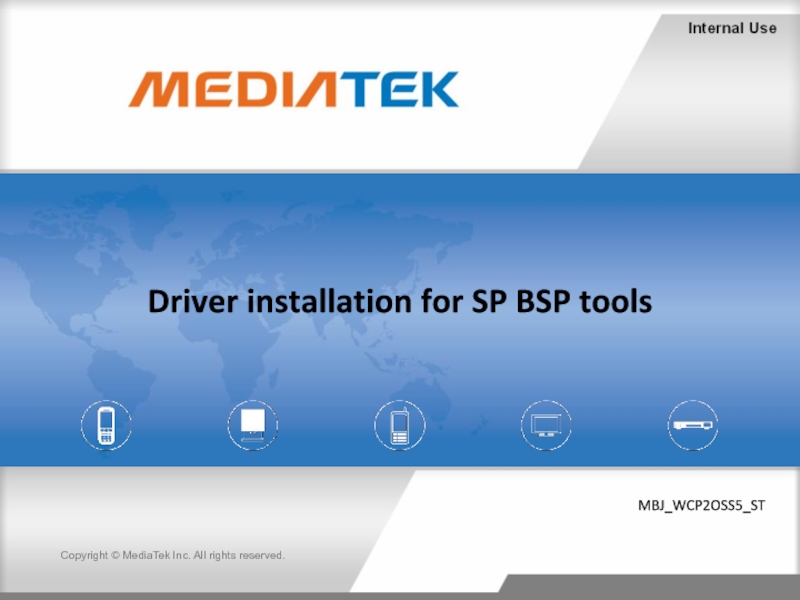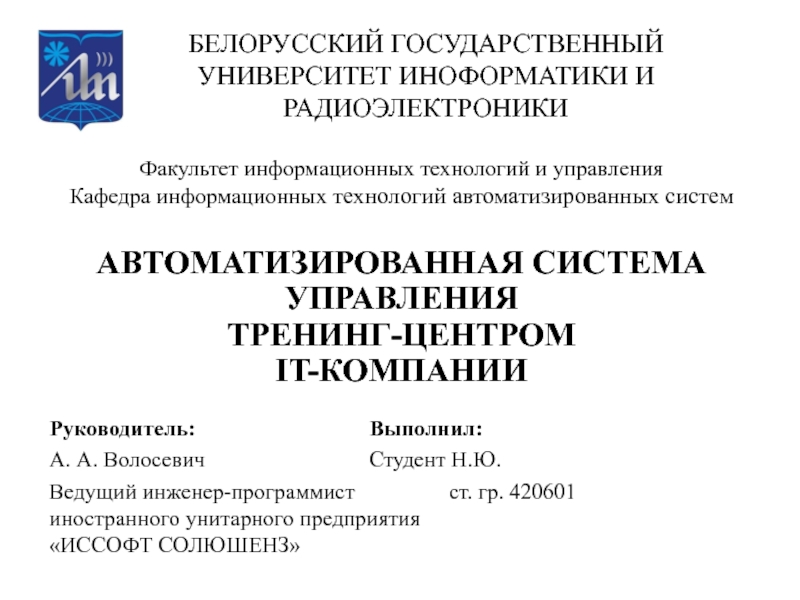- Главная
- Разное
- Дизайн
- Бизнес и предпринимательство
- Аналитика
- Образование
- Развлечения
- Красота и здоровье
- Финансы
- Государство
- Путешествия
- Спорт
- Недвижимость
- Армия
- Графика
- Культурология
- Еда и кулинария
- Лингвистика
- Английский язык
- Астрономия
- Алгебра
- Биология
- География
- Детские презентации
- Информатика
- История
- Литература
- Маркетинг
- Математика
- Медицина
- Менеджмент
- Музыка
- МХК
- Немецкий язык
- ОБЖ
- Обществознание
- Окружающий мир
- Педагогика
- Русский язык
- Технология
- Физика
- Философия
- Химия
- Шаблоны, картинки для презентаций
- Экология
- Экономика
- Юриспруденция
TV news newsgathering презентация
Содержание
- 1. TV news newsgathering
- 2. NEWSGATHERING: SOURCES News Agencies Own Reporters
- 3. NEWS AGENCIES. These organizations sell their stories
- 4. WORLDWIDE TV NEWS AGENCIES The following are
- 5. NEWS AGENDA: News Categories HARD NEWS
- 6. THE NEWS PROCESS 1 Producing
- 7. THE NEWS PROCESS 2 Editorial meeting &
- 8. THE NEWS PROCESS 3 Anchors prepare
- 9. NEWS VALUES 1: Galtung & Ruge 1973
- 10. NEWS VALUES 2: Jeremy Tunstall 1971 Galtung
- 11. NEWS VALUES 3: Dennis McShane 1979 Dennis
- 12. NEWS VALUES: Time, Economics & Ratings Time:
- 13. NEWS VALUES: GATEKEEPING 1 Gatekeeping was a
- 14. NEWS VALUES: GATEKEEPING 2 Everyone involved in
- 15. NEWS VALUES: GATEKEEPING 3 News agendas vary
- 16. NEWS VALUES: Writing Tomorrow
Слайд 2NEWSGATHERING: SOURCES
News Agencies
Own Reporters plus stringer
Press releases / VNRs
Press Conferences
Public Relations
(PR) Companies
Institutions: university, L3, chamber of commerce, etc.
Organizations (CAB, Lions Club, Red Hat Society)
Local government
Anniversary Stories
Court cases or Trials
Other Media News. Newspapers, Twitter etc. (legal)
Institutions: university, L3, chamber of commerce, etc.
Organizations (CAB, Lions Club, Red Hat Society)
Local government
Anniversary Stories
Court cases or Trials
Other Media News. Newspapers, Twitter etc. (legal)
Слайд 3NEWS AGENCIES.
These organizations sell their stories to news producers
Worldwide (AP
is a co-op). Each agency has their own reporters, photographers and broadcast crews. The Associated Press transmits thousands of stories and hundreds of pictures every day. They have both footage and edited packages ready for transmission.
Associated Press (International organization)
Reuters (International organization)
United Press International (International organization)
CNN – different relationship
Network relationship—CBS, ABC, NBC
Associated Press (International organization)
Reuters (International organization)
United Press International (International organization)
CNN – different relationship
Network relationship—CBS, ABC, NBC
Слайд 4WORLDWIDE TV NEWS AGENCIES
The following are specialist TV news agencies
that developed
from traditional press based
agencies. These are dominated by western
based companies whose values are rooted in
British and American ideologies. So is
international news guilty of media imperialism?
Reuters TV
BBC News
APTN Associated Press Television News
CNN
agencies. These are dominated by western
based companies whose values are rooted in
British and American ideologies. So is
international news guilty of media imperialism?
Reuters TV
BBC News
APTN Associated Press Television News
CNN
Слайд 5NEWS AGENDA: News Categories
HARD NEWS
Politics
Economy
Foreign Affairs
Home Affairs
Disasters
SOFT NEWS
Human Interest
Entertainment
Sport
How news producers
construct & prioritize news stories and set their own news agenda
Слайд 6THE NEWS PROCESS 1
Producing a news program means defining and predicting
the news. Editors (editorial staff not video editors) will be overseeing the planning and preparation of the news all day long with their team.
What follows is an example of a typical day. BUT remember a late breaking important story can mean all the planning goes out of the window and everything has to change to roll with the news story OR new developments.
What follows is an example of a typical day. BUT remember a late breaking important story can mean all the planning goes out of the window and everything has to change to roll with the news story OR new developments.
Слайд 7THE NEWS PROCESS 2
Editorial meeting & rough running order
Editorial conference about
news agenda (9am)
News stories assigned researcher & reporters briefed
Crews sent out to start news gathering
Graphics and studio work organized
Video editors & producers prepare short items
Producer oversees rundown and assignment development
Assistant Producers write up stories
Library researchers get back up footage for stories
Video editors produce news packages for days stories
News stories assigned researcher & reporters briefed
Crews sent out to start news gathering
Graphics and studio work organized
Video editors & producers prepare short items
Producer oversees rundown and assignment development
Assistant Producers write up stories
Library researchers get back up footage for stories
Video editors produce news packages for days stories
Слайд 8THE NEWS PROCESS 3
Anchors prepare and rehearse scripts
Assistant producers write final
scripts
Program is rehearsed & final story selection made
Prompter script is finalized
VTR inserts / video files are cued up / set up
Producer & studio director can change rundown
Anchors have to be able to change running order
Director oversees process in control room
Crew: TD, server, Audio, prompter, graphics
Program is rehearsed & final story selection made
Prompter script is finalized
VTR inserts / video files are cued up / set up
Producer & studio director can change rundown
Anchors have to be able to change running order
Director oversees process in control room
Crew: TD, server, Audio, prompter, graphics
Слайд 9NEWS VALUES 1: Galtung & Ruge 1973
Immediacy: Has it happened recently?
Familiarity:
Is it culturally close to us?
Amplitude: Is it a big event that affects large numbers?
Frequency: Does the event happen often?
Unambiguity: Is it clear and definite?
Predictability: Did we expect it to happen?
Surprise: Is it rare or unexpected event?
Continuity: Has it previously been defined as news?
Prominent Nations/People: Big countries or celebrities?
Personalization: Is it a human interest story?
Negativity: Is it bad news?
Balance: ”and finally” fun story to balance bad news…
Amplitude: Is it a big event that affects large numbers?
Frequency: Does the event happen often?
Unambiguity: Is it clear and definite?
Predictability: Did we expect it to happen?
Surprise: Is it rare or unexpected event?
Continuity: Has it previously been defined as news?
Prominent Nations/People: Big countries or celebrities?
Personalization: Is it a human interest story?
Negativity: Is it bad news?
Balance: ”and finally” fun story to balance bad news…
Слайд 10NEWS VALUES 2: Jeremy Tunstall 1971
Galtung & Ruge’s news values primarily
deal with news
stories in newspapers but can be applied to TV news also.
Tunstall took a step further and argued that the following
factors also greatly shaped TV News.
Importance of the visual. If good footage is available the story may become more important in TV news agenda.
News stories with “own reporters” conducting IV’s or commentating are preferred.
TV News covers far fewer stories than newspapers. The stories are also shorter and generally in less depth.
Hard news or sound bite is preferred.
stories in newspapers but can be applied to TV news also.
Tunstall took a step further and argued that the following
factors also greatly shaped TV News.
Importance of the visual. If good footage is available the story may become more important in TV news agenda.
News stories with “own reporters” conducting IV’s or commentating are preferred.
TV News covers far fewer stories than newspapers. The stories are also shorter and generally in less depth.
Hard news or sound bite is preferred.
Слайд 11NEWS VALUES 3: Dennis McShane 1979
Dennis McShane identifieds the following 5
criteria
as being used by journalists in their
selection of news stories.
Conflict.
Hardship & Danger to the Community.
The Unusual.
Scandal.
Individualism.
selection of news stories.
Conflict.
Hardship & Danger to the Community.
The Unusual.
Scandal.
Individualism.
Слайд 12NEWS VALUES: Time, Economics & Ratings
Time: Only a certain number of
stories can be covered in a 30 minute news program. So decisions have to be made which are not only due to news values but economics and ratings. News is rarely allowed to overrun.
Economics: It is impossible to have a news crew at every story across the world. TV News is expensive to make so resources have to be allocated carefully.
Ratings: Are important to broadcasters and it is essential that the news can hold or even attract an audience. ‘sweeps’
Economics: It is impossible to have a news crew at every story across the world. TV News is expensive to make so resources have to be allocated carefully.
Ratings: Are important to broadcasters and it is essential that the news can hold or even attract an audience. ‘sweeps’
Слайд 13NEWS VALUES: GATEKEEPING 1
Gatekeeping was a term coined by Galtung &
Ruge to refer to the decisions made by news producers when selecting or rejecting potential news stories.
A select few people are shaping the news stories that are reported daily to millions of audience members and they are shaping and determining what is news.
Consider why some events, issues of groups are presented in particular ways such as illegal immigrants. Also why some message and ideological views are rarely seen or heard on the news….
A select few people are shaping the news stories that are reported daily to millions of audience members and they are shaping and determining what is news.
Consider why some events, issues of groups are presented in particular ways such as illegal immigrants. Also why some message and ideological views are rarely seen or heard on the news….
Слайд 14NEWS VALUES: GATEKEEPING 2
Everyone involved in the creation of TV news
acts as a gatekeeper in some way as creating representations while they re-present the news. This includes producers, camera-people and also video editors etc. Their decisions depend upon the following.
The news values of the institution
The news values and priority of them to the show
The expectations of their audience
Their own ideological values
Their education, class and upbringing
The news values of the institution
The news values and priority of them to the show
The expectations of their audience
Their own ideological values
Their education, class and upbringing
Слайд 15NEWS VALUES: GATEKEEPING 3
News agendas vary in different TV news shows.
CNN and most American mainstream ‘news’ has a liberal slant.
Stuart Hood (1972) argues that the majority of media gatekeepers practice “middle-class consensus politics” that affects their news agenda decisions.
Noam Chomsky argued for what he called the Propaganda Model of news – news agencies follow a particular pattern that reinforces the views of the ‘elite’ and provides ‘emotionally potent simplification’ to the mass audience that does not understand or care about ‘power’ – they are all ‘sheep’
Слайд 16NEWS VALUES:
Writing
Tomorrow – meet in PAC 117.
We’ll do some practice
writing both based on developing broadcast style skills but also trying to understand ‘slant’ and ‘propaganda’ better.
###
###

